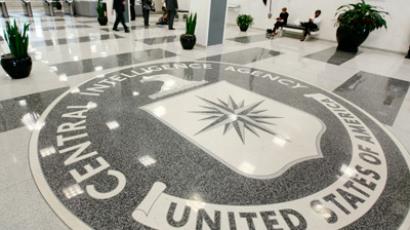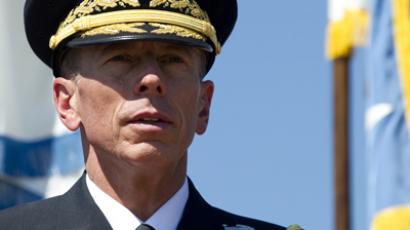Petraeus resignation: ‘Scandal may be political not sexual’
There may be more to former CIA director David Petraeus’ resignation than just a sex scandal. Now, he may not have to give evidence to Congress about what happened in Benghazi, James Corbett, editor of the Corbett Report, explained to RT.
The “operation to take down Petraeus may be motivated by backdoor political dealings,” says Corbett. He also says that a change in the top at the CIA may lead to policy changes in regard to Afghanistan and drone strikes in neighboring Pakistan. RT: Of course, decisions made by the CIA resonate across the globe – what are the implications of General Petraeus’ resignation, do you think, for the US? James Corbett: Well it’s a good question, one that hasn’t been asked enough in this scandal. If the old adage is true, that nothing in politics happens by accident, then I think that’s nowhere more true than is it when it comes to these political sex scandals. As we’ve seen over the years, for example with the DC Madame case – where her client list was covered up by her murder or suicide, depending on which side of that debate you come down on, or Elliot Spitzer penning an editorial in the Washington Post, exposing the subprime mortgage crisis and then being caught up in his own sex scandal literally just hours later after a leak of FBI wire tap information to The New York Times. So the question as to why is this scandal emerging now, why it is embroiled on General Petraeus’ and what information did he have that would potentially have been interesting to people … interested in bringing him down, and we can start to see some pieces of this puzzle emerging. It becomes clear now that there is the indication that he will not be testifying in upcoming congressional hearings into what happened in Benghazi in September. And because of that, some key information about what happened in Benghazi might not come to light – including some interesting information which just emerged recently, in fact last month, that general Petraeus’ alleged mistress, Miss Broadwell, was giving speeches about how the CIA annex in Benghazi was being used as a secret prison, which is why it was attacked in September. So there are some very big things which are emerging right now and it looks like the operation to take down Petraeus at this particular moment might be motivated by some of those backdoor political dealings, rather than the sex scandal that it is supposedly made out to be. RT: I’m just curious, this operation to remove Petraeus, who do you think is behind this? Do you blame the Obama administration, or are there other forces at hand here? JC: I think it would be too early to speculate on that, and it depends how the events play out to see whether there is more information coming out on that. It depends, for example, if he does end up testifying at the Benghazi hearings, for example who is ultimately selected to replace him – and there are some interesting characters in the running for that. John Brennan’s name has been thrown around, and he was the CEO of a company called Analysis Inc back in 2008, when one of the people working for Analysis Inc was a contractor for the State Department who accessed President Obama’s passport records illegally, and one of the key witnesses in that case got covered up entirely. So there are some interesting connections around the people who may be slated to replace Petraeus. RT:Well of course Petraeus has made his name for the counter insurgency policy in Iraq and Afghanistan, and I really want to focus on Afghanistan here, because the war, even though its supposed to be winding down, its really not. All the time there, on the ground it's not getting better at all, in fact I’m flying there this evening myself – what do you think, will this scandal in any way effect the situation there, and are there any implications for Afghanistan? JC: I don’t think there are any immediate ramifications for this, because of Petraeus role as CIA director for the last year and a half, that’s sort of overshadowed his role in Afghanistan. But certainly the question of what’s going to happen in 2014 – whether the ISF will pull out of Afghanistan as scheduled – is still very much up in the air, and again, I don’t think that’s going to come down to a conclusion any time soon, and I’m not sure how that is going to be effected by Petraeus’ resignation, although certainly the CIA and its implications for the drone strikes in Pakistan play a very key role in what is happening in the entire Afghanistan security situation. So we’ll see if a change in the leadership at the CIA provokes any change whatsoever in CIA drone strikes.














